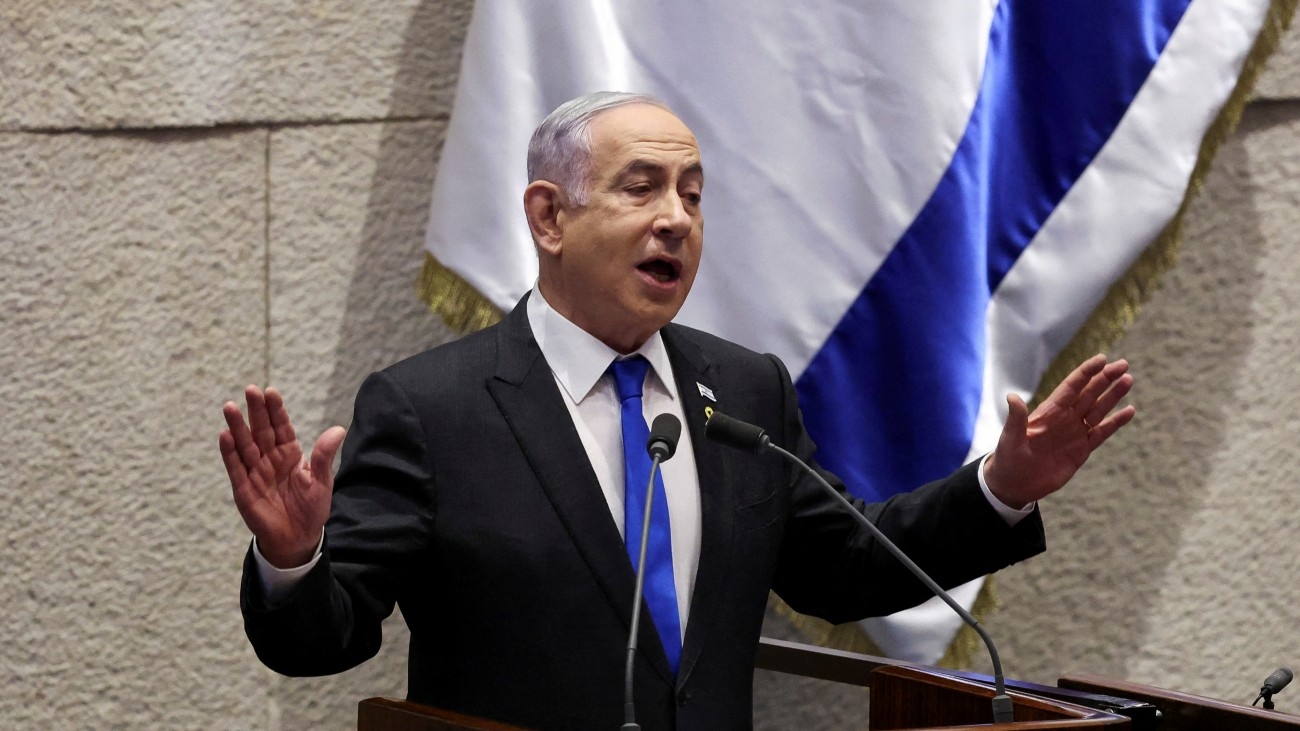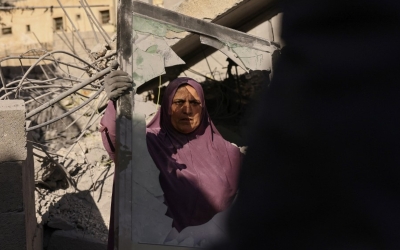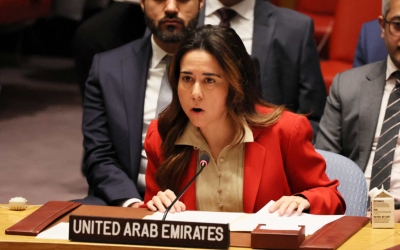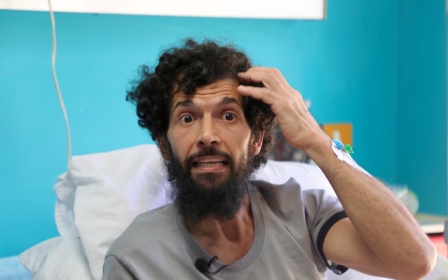Israel's parliament passes bill rejecting Palestinian statehood

Israel's parliament overwhelmingly passed a resolution late on Wednesday that rejects the establishment of a Palestinian state, a decision that is likely to irk some Democrats just days before Israeli Prime Minister Benjamin Netanyahu is slated to visit to the US and address Congress.
The bill, which was co-sponsored by Netanyahu's coalition along with right-wing parties in the opposition, was passed by a majority of 68 votes, with only nine parliamentarians voting against it.
Benny Gantz, who is seen by many leaders in the West as a more moderate figure than Netanyahu, voted in favour of the bill, along with his party.
The resolution completely rejects Palestinian statehood, even as part of a negotiated settlement with Israel.
"The Knesset [parliament] of Israel firmly opposes the establishment of a Palestinian state west of Jordan," the resolution stated.
New MEE newsletter: Jerusalem Dispatch
Sign up to get the latest insights and analysis on Israel-Palestine, alongside Turkey Unpacked and other MEE newsletters
"The establishment of a Palestinian state in the heart of the Land of Israel will pose an existential danger to the State of Israel and its citizens, perpetuate the Israeli-Palestinian conflict and destabilise the region.
"It will only be a matter of a short time until Hamas takes over the Palestinian state and turns it into a radical Islamic terror base, working in coordination with the Iranian-led axis to eliminate the State of Israel.
"Promoting the idea of a Palestinian state at this time will be a reward for terrorism and will only encourage Hamas and its supporters to see this as a victory, thanks to the massacre of October 7, 2023, and a prelude to the takeover of jihadist Islam in the Middle East," it added.
Mustafa Barghouti, the secretary-general of the Palestinian National Initiative, slammed the passing of the resolution.
"No Zionist party from both the government and the opposition voted against the resolution," he wrote on X, formerly Twitter.
"This resolution represents a rejection of peace with Palestinians and an official declaration of the death of [the] Oslo agreement," Barghouti posted.
The Israeli kneset voted with absolute majority against the establishment of a Palestinian State . No zionist party from both the government and the opposition voted against the resolution.
— Mustafa Barghouti @Mustafa_Barghouti (@MustafaBarghou1) July 18, 2024
This resolution represents a rejection of peace with Palestinians and an official…
Signed in 1993 and 1995 between Israel and the Palestine Liberation Organisation (PLO), then headed by Yasser Arafat, the Oslo Accords were meant to lead to an independent Palestinian state by establishing the Palestinian Authority (PA) - a temporary self-governing body.
But the accords included clauses that created new challenges for Palestinians under occupation - such as the forfeiting of more than 60 percent of the West Bank under Israeli control, and the introduction of controversial security coordination between Israel and the PA.
Since then, Israel has retained overall control of the occupied West Bank and imposed a complete blockade of Gaza in 2007 when Hamas came to power through legislative elections.
Israel's parliament had already approved a Netanyahu-sponsored bill which rejected Palestinian statehood back in February, but Wednesday's bill was more of a reaction to reports of countries recognising Palestine.
This new bill comes as Netanyahu is set to speak in front of Congress next week, which has already caused divisions and debate among the country's Democratic lawmakers.
Netanyahu is also set on meeting US President Joe Biden, though the latter's positive Covid-19 test may complicate the meeting’s logistics.
Biden has repeatedly stated his country’s support for a two-state solution.
The bill also directly contradicts the speech made by King Charles on Wednesday which reiterated the UK's policy for a two-state solution.
Earlier on Wednesday, United Nations Secretary-General Antonio Guterres said that Israel’s policies in the occupied West Bank were dooming any prospect of a two-state solution.
Through administrative and legal steps, Israel is changing the geography of the West Bank, Guterres said in a statement read by his chief of staff, Courtenay Rattray, during a meeting of the UN Security Council.
"Recent developments are driving a stake through the heart of any prospect for a two-state solution," he said. "We must change course. All settlement activity must cease immediately."
The UN chief added that the settlements were a flagrant violation of international law and an obstacle to peace with Palestinians.
Air strikes intensify
Overnight, at least six people were killed in an Israeli strike on a home in al-Zawayda, in central Gaza, while at least one other person was killed in an Israeli attack on a mosque in the Nuseirat refugee camp.
An Israeli drone strike on the east of Lebanon's Beqaa also reportedly killed a member of al-Jamaa al-Islamiya group, according to Al Jazeera.
And early on Thursday, footage released on social media appeared to show an Israeli strike targetting a donkey cart pulling civilians in Rafah in southern Gaza.
Israeli attacks across the Gaza Strip have killed dozens of Palestinians in recent days, including 17 people who were killed near a tented area housing displaced people in the designated "safe" zone of al-Mawasi in Khan Younis on Tuesday.
The attack on al-Mawasi came after air strikes killed at least 88 people and wounded 289 others last week in a displaced people's camp in the same district.
The United Nations said on Tuesday that the past week had been one the deadliest in the Gaza since the start of the war on 7 October.
More than 38,000 Palestinians have been killed by Israel's war on Gaza since October, according to local officials. The majority of the dead are women and children.
UAE official calls for international force
Earlier on Wednesday, a senior Emirati official backed the idea of deploying an international force to provide "law and order" in the besieged Gaza Strip under the auspices of the Palestinian Authority, in one of the the clearest signs yet that Gulf powers were inching closer to an agreement for a post-war force in Gaza that the US has been lobbying for.
Lana Nusseibeh, the UAE’s former ambassador to the United Nations, now an assistant minister for political affairs in the UAE, called for a "temporary international presence in Gaza" in an opinion article published in the Financial Times.
Nusseibeh called for "a temporary international mission that responds to the humanitarian crisis, establishes law and order, lays the groundwork for governance and paves the way to reuniting Gaza and the occupied West Bank."
Hamas and Israel are still locked in ceasefire talks aimed at ending the war that has killed almost 39,000 Palestinians, the vast majority of them women and children. Thousands more are missing.
The two sides have been back and forth over a three-phased proposed outline for the agreement presented by mediators from the US, Qatar and Egypt.
The mediators have not publicly detailed the full contents of the proposal, but the broad contours of the deal, according to previous rounds of negotiations shared with MEE, involve a six-week pause in fighting, in which Hamas will release some Israeli captives it has held since 7 October when it attacked southern Israel.
In exchange, Israel is expected to release a number of Palestinian prisoners, withdraw its troops from certain regions of the Gaza Strip and allow Palestinians to travel from the south of the territory to the north.
During the second phase, there would be a direct announcement of a permanent cessation of military operations before the remaining Israeli captives are exchanged for more Palestinian prisoners.
In the last phase, there would be a complete lifting of the blockade of the Gaza Strip.
In May, a senior Palestinian source with knowledge of Hamas policies, told MEE that Hamas was prepared to show "flexibility" about the future governance of Gaza, as long as the decision to rule the war-battered enclave is agreed upon by other Palestinian factions and is not imposed by either the US or Israel.
Middle East Eye delivers independent and unrivalled coverage and analysis of the Middle East, North Africa and beyond. To learn more about republishing this content and the associated fees, please fill out this form. More about MEE can be found here.







